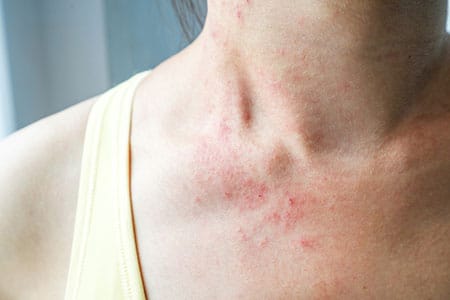Eczema, also referred to as atopic dermatitis, is a chronic inflammatory skin condition that most commonly presents as an itchy, red rash. It can appear all over the body but regularly emerges on the elbows and the knees. Babies tend to develop eczema on the face, especially the cheeks and chin. Individuals affected by eczema are usually diagnosed in infancy or as young children, and their condition often becomes less severe as they grow into adults. However, there are some cases where eczema can either continue or emerge in adulthood.
Symptoms of Eczema
Eczema occurs when the skin’s outermost layer, known as the epidermis, becomes dry and itchy. This inflammatory condition flares up when the immune system overreacts to triggers in the environment and may look like:
- Bumpy rashes
- Scaly rashes
- Very dry skin
- Oozing or crusting
- Areas of swelling
- Skin infections
- Intense itchiness
The symptoms of eczema vary from person to person. The rash may even look different or affect different parts of your body from time to time and range from mild or moderate to severe.
Causes of Eczema
Although the exact cause of eczema is unknown, health providers believe that eczema has a genetic predisposition and often begins with a skin barrier defect that allows irritants to enter the body easily. Certain environmental factors that may provoke a flare in eczema include:
- Fragrant soaps, detergents, or perfumes
- Wool and synthetic fibers
- Airborne allergens: dust mites, animal dander, pollen, mold
- Cigarette smoke
- Extreme temperatures
- Certain foods
- Emotional stress
To manage your eczema, it will be important to be aware of your triggers so that you can avoid exposure to them. Paired with a daily bathing and moisturizing routine and prescribed treatments, eczema can be successfully regulated.
Treatments for Eczema
The dermatology providers and staff at Cascade Eye & Skin Centers can assist eczema patients with prescription and non-prescription topical medications. In severe cases of eczema, injectable medications are used. Other treatment options include:
- Antihistamines
- Topical and/or Oral medications
- Phototherapy
- Biologic Medications (for moderate to severe cases)
For at-home care, our dermatologist recommended avoiding hot baths and showers, moisturizing every day, using a humidifier in dry and cold weather, and wearing soft fabrics. Our exemplary providers will customize eczema treatment plans and recommendations based on each individual’s age and condition.


